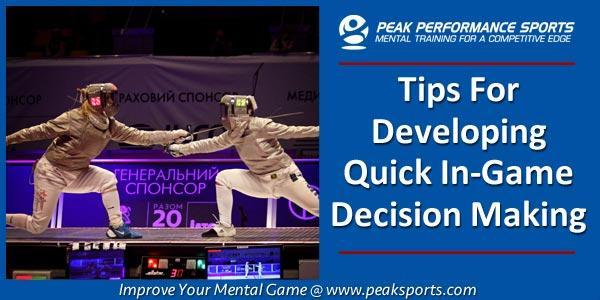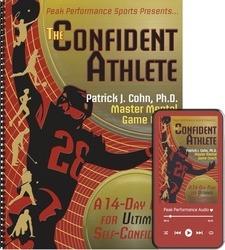
Athletes Who Second Guess Themselves
Making quick decisions is essential in fast moving, dynamic sports.
Sports like volleyball, fencing, wrestling, tennis, etc. require fast decisions, sometimes within milliseconds, in order to be successful.
Athletes who master the skill of quick, decisive decision making tend to dictate the flow of the game or match, feel in control and confident, and are able to make things happen in competition.
The flip-side of decisive thinking are the over-thinkers or athletes who second-guess…
These athletes second-guess their decisions, over-analyze the situation, and lack trust in their ability to make the right decisions.
Over-thinkers are afraid to make mistakes so they hesitate before acting, giving their opponent a huge advantage.
You don’t have a lot of time to weigh your options in competitive sports, especially when a 75mph volleyball serve is heading your way. You only have about 0.21 seconds to make the correct read, position your body and plan where you want to hit the ball.
In baseball, a 95mph ball takes approximately 0.40 seconds to home plate. Not a lot of time to identify the pitch, location, whether you will swing or where you want to hit the ball. You don’t have time to think, only react.
Now you understand the importance of quick decisions during competition.
The question is: Can you improve the mental skill of decision making and, if so, how?
To answer the first part of the question… if decision making is a skill, then yes, it can be improved with consistent repetition over time.
How? The answer may seem obvious but practice under game-like conditions. The key is to keep working on your decision making capabilities until that skill becomes reflexive (like brushing your teeth).
Eli Dershwitz is the youngest fencer on the U.S. Olympic men’s fencing team and top-ranked saber fencer in the United States.
Dershwitz is known for thinking quick on his feet… which is critical because many bouts are often decided in under 60 seconds.
DERSHWITZ: “It’s a lot faster-paced — fast reactions, fast touches, a lot of sprints. That always got to me, the amount of physical and mental ability it took at the same time, to be able to be explosive but also to be able to react quickly to what your opponent was doing.”
The secret to Dershwitz’s quick decision making is the amount of time he dedicates towards developing that mental skill until it becomes second nature.
Dershwitz put in the work so he can rely on lightning fast decision making instead of a slow laborious thought process that interferes with the body’s ability to react quickly.
Dershwitz will need to rely on his quick decision making if he plans to land on the podium in Rio.
DERSHWITZ: “I am just looking forward to putting all the hard work and dedication, all the hours of blood, sweat, and tears over the years… into one great tournament.”
Tips for developing quick in-game decision making:
Practice makes better, so follow this 4 step plan:
–Practice being decisive during practice at game speed.
–Create pressure-packed game scenarios in practice.
–Review your progress after practice and determine if you need to make any adjustments.
–Repeat during your next training session.
Learn all my secrets for performing with trust here.
Related Sports Psychology Articles
- Improve Your Decision Making When Competing
- How to Grow Competition Confidence
- How Preparation Boosts Confidence
*Subscribe to The Sports Psychology Podcast on iTunes
*Subscribe to The Sports Psychology Podcast on Spotify
Download a free sports psychology report to improve your mental game!
Learn more about our one-on-one mental game coaching.
The Confident Athlete

“The Confident Athlete” consists of 2 audio programs that include 14 days of confidence fueling exercises and a simple to follow workbook that guides you through the 14 days, helps you apply the strategies, and customizes the exercises to your personal needs.
Let me help you put a stop to the confidence leak. You can learn to have greater levels of confidence in competition than you do in practice by identifying the specific ways you undermine your own confidence and how to convert your practice confidence into COMPETITIVE CONFIDENCE.
“The Confident Athlete” is a ground-breaking system to teach you how to think like a champion and have ultimate self-confidence every time you step on the playing field, court, track, or course. The confident athletes was developed for any athlete – junior to professional –that wants to gain confidence. However, coaches and sports parents can learn how to teach others to perform with ultimate confidence. Use my program if you want to bust a slump or just wanting higher or more consistent levels of self-confidence.
